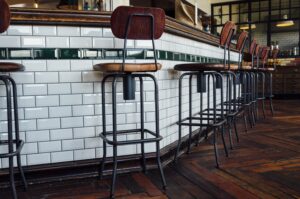How to choose the right wood for your bar’s countertop
 The wood for your bar’s countertop is what would give your space a lot of its look and functionality. There’s no doubt that a warm presentation with welcoming ambiance, allied with an overall wide scope of design configurations such as rustic, to modern decor, and wood countertops are in high demand. But while you’re making the selection, the reader will need to know a few things about the wood he or she is looking at: its characteristics, what others can make it suitable for, and what particular needs it will meet.
The wood for your bar’s countertop is what would give your space a lot of its look and functionality. There’s no doubt that a warm presentation with welcoming ambiance, allied with an overall wide scope of design configurations such as rustic, to modern decor, and wood countertops are in high demand. But while you’re making the selection, the reader will need to know a few things about the wood he or she is looking at: its characteristics, what others can make it suitable for, and what particular needs it will meet.
Understanding wood types
The choice of wood plays a significant role when selecting materials, especially for commercial butcher block bar tops. Different types of wood offer varying levels of durability, maintenance requirements, and aesthetic appeal, making it essential to choose the right one for high-traffic surfaces like bar tops.
1. Hardwoods vs. softwoods
- Hardwoods: These are the most durable and resistant to wear. Options include maple, walnut, cherry, and oak. They are usually strong enough to use under pressure and less likely to get dented or scratched.
- Softwoods: These are a lot cheaper, but pine or fir as a countertop does not really make sense since it wears fast and tears easily and requires more maintenance.
2. Common wood types for countertops
- Maple: The maple has a pale appearance and is fine grain. Maple is very strong and resistant to scratches. Smoothened maple looks gorgeous and stunning in any interior.
- Walnut: Walnut wood has deep dark colors and possesses grain patterns. Walnut is strong and does not wear out soon; thus applied in areas where heavy traffic will be encountered.
- Cherry: Cherry is open-grained wood that darkens over time to yield a great patina that adds character to the finish. While it is softer than maple or walnut, it can retain a beautiful finish and requires relatively low maintenance.
- Oak: Oakwood offers classic elegance because of its pronounced grain and durability. It’s less resistant to wear and tear compared to other hardwoods, but it will also take the pounding.
- Bamboo: Technically, bamboo is a type of grass, but with great eco-friendliness and good durability. Its appearance gives your bar that modern flair.
Aesthetics
The looks of your countertop determine the ambiance of your bar. Now here’s what should consider when it comes to aesthetics:
1. Color and grain
Choose the right wood species that will complement the overall design of your bar. Lighter woods like maple give a very airy feel, while darker woods such as walnut or cherry add warmth and class.
2. Finish options
The wood can take a finish which largely contributes to its appearance as well as durability. Oiled finishes enhance the natural beauty of the wood with some protection against moisture and stains. Varnished finishes give a more robust protective layer but may change the wood’s natural look considerably.
Durable and low maintenance
In a bar setting which is likely to experience spills and heavy use, durability should be one of the factors considered in choosing a countertop material. Here’s what you need to know:
1. Stain and scratch resistance
Hardwoods generally prove more resistant to stains than softwoods. Many of them can also be sanded down in cases of scratches, making it easier to restore rather than replace the material.
2. Regular maintenance
Wood countertops should be maintained to preserve their appearance as well as long durability.
- Oiling: Most wood countertops prefer periodical oiling, every 3-6 months, as it would keep their appearance unchanged and prevent the onset of moisture in the surface.
- Cleaning: Mild soap and water should be used and avoid using chemical-based cleaning agents that might damage the finish.
- Preventative measures: Always clean spills quickly to not let stains happen. Using cutting boards also helps minimize scratches on the countertop.
Environmental considerations
Sustainability is now a significant factor for selecting materials:
1. Sourcing
Find sustainably sourced woods, or opt for reclaimed wood as an eco-friendly option that gives personality to your countertops.
2. Certifications
Check if the wood has certifications through organizations, such as the FSC Forest Stewardship Council, which signifies responsible forest management practices.
Cost considerations
 You should budget for your countertops:
You should budget for your countertops:
- Material: Hardwoods are pricier than softwoods since they are sturdier and aesthetically pleasing.
- Installation: Whether installing the countertop yourself or employing professionals is an added cost to consider.
Conclusion
Selecting a countertop made of the proper type of wood for your bar demands balance between aesthetics and functionality, durability and maintenance needs, cost and sustainability considerations. Only then can you make the perfect choice for a countertop that does justice to your space while being perfectly functional to be put to test with daily use.
You will spend time on this decision, but it will pay off in the beauty of a functional bar area representing your style with long-lasting performance. Whether you decide on the classic elegance of walnut or the bright simplicity of maple, you can be sure that your choice will contribute immensely to the general ambiance of your bar space.

